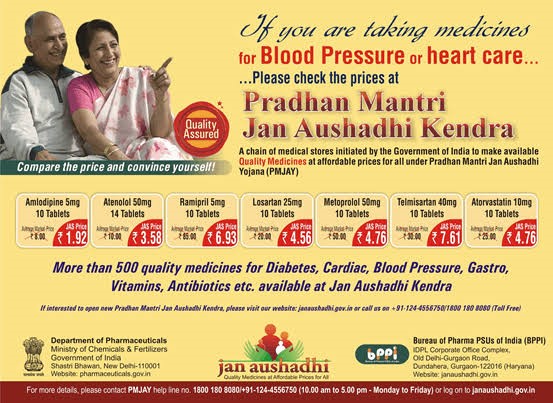CURRENT AFFAIRS
Get the most updated and recent current affair content on Padhaikaro.com
Pradhan Mantri Jan-Aushadhi Yojana (PMJAY)
- IAS NEXT, Lucknow
- 09, Oct 2021

PM Bhartiya Janaushadhi Pariyojana has achieved the target of opening 8,300 kendras for FY22 in just 6 months.
Background:
With a vision to provide quality medicines at an affordable rate to the common man especially the poor, the Government has set a target to increase the number of Pradhan Mantri Bhartiya Janaushadhi Kendras (PMBJKs) to 10,000 by March 2024. As on October 05, 2021, the number of stores has increased to 8355.
Performance of the scheme:
- All the districts of the country have been covered under the scheme.
- Effective IT-enabled logistics and supply-chain systems for ensuring real-time distribution of medicines at all outlets have also been introduced.
- Product basket of PMBJP presently comprises 1,451 drugs and 240 surgical instruments.

About PMBJP:
It is a campaign launched by the Department of Pharmaceuticals of the Ministry of Chemicals and Fertilizers.
- It seeks to provide quality medicines at affordable prices to the masses through special kendra’s known as Pradhan Mantri Bhartiya Jan Aushadhi Kendra.
- Initially launched in 2008, the scheme was rechristened in 2015.
- The Pharmaceuticals & Medical Devices Bureau of India (PMBI) is implementing the scheme.
Key features of the scheme:
- Ensure access to quality medicines.
- Extend coverage of quality generic medicines so as to reduce the out of pocket expenditure on medicines and thereby redefine the unit cost of treatment per person.
- Create awareness about generic medicines through education and publicity so that quality is not synonymous with only high price.
- A public programme involving Government, PSUs, Private Sector, NGO, Societies, Co-operative Bodies and other Institutions.
- Create demand for generic medicines by improving access to better healthcare through low treatment cost and easy availability wherever needed in all therapeutic categories.
World Health Organization – Good Manufacturing Practices (WHO-GMP):
Under the Scheme, medicines are procured from World Health Organization – Good Manufacturing Practices (WHO-GMP) certified suppliers for ensuring the quality of the products.
Good Manufacturing Practices (GMP, also referred to as ‘cGMP’ or ‘current Good Manufacturing Practice’) is the aspect of quality assurance that ensures that medicinal products are consistently produced and controlled to the quality standards appropriate to their intended use and as required by the product specification.
- GMP also has legal components, covering responsibilities for distribution, contract manufacturing and testing, and responses to product defects and complaints.